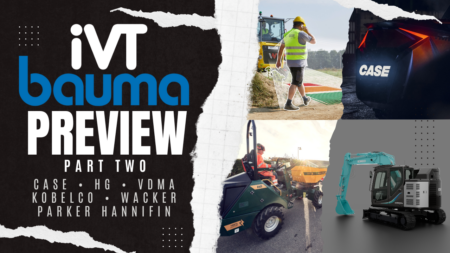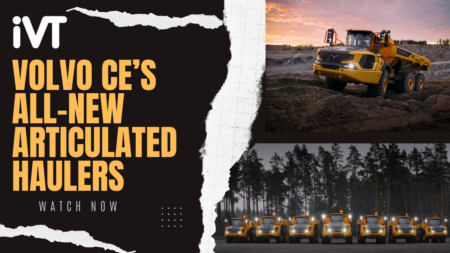Case Construction Equipment used this year’s ConExpo to launch “Project Zeus”, aka the 580 EV – the construction industry’s first fully electric backhoe loader. Ed Brenton, product marketing manager with Case, took to the floor and offered a walkaround to those assembled.
“The backhoe loader is perfectly suited for electrification,” remarked Eric Zieser, director, global compact equipment product line, Case. “The varied use cycles, from heavy to light work, provide an excellent opportunity to convert wasted diesel engine hours into zero consumption battery time — yet offer the operator instantaneous torque response when needed. At low idle a diesel engine has reduced torque and requires time for the engine to ramp up to meet the load demands. Electric motors, on the other hand, have instantaneous torque and peak torque available at every operating speed.”
Urban environments
The 580 EV is powered by a 480-volt, 90-kilowatt-hour lithium-ion battery pack that can be charged by any 220-volt/three-phase connection. While applications will vary, each charge will support most common eight-hour workdays. The battery separately powers the drivetrain and hydraulic motors, resulting in hydraulic breakout forces equal to diesel-powered machines and improved performance during simultaneous loader and drivetrain operation.
Utilities, utility contractors, as well as government and public works operations, are well suited for the 580 EV as they generally have initiatives aimed at lowering emissions, reducing noise in public workspaces, and finding new ways to work within budgets. Contractors who bid work in states where even greater regulations are in place — such as New York, California and Florida — may also benefit from deploying electric backhoes in their fleet. Many contractors in these sectors either road or trailer these machines back to a central shop or yard at the end of the day, making it easy to plug into existing electrical infrastructure, or to develop charging stations in a controlled yard. Utilities who operate their own backhoe fleets can power each machine off of the electricity they generate, essentially operating the machine at cost.
Sustainability
The 580 EV operates with zero emissions — lowering the total carbon footprint for its owners. These are important environmental considerations, but the new backhoe also helps improve fiscal sustainability.
- While every application will be different based on its workload, it is estimated that the 580 EV could save fleets as much as 90 percent in annual vehicle service and maintenance costs when taking into account the reduction/elimination of diesel, engine oil, diesel exhaust fluid, regular preventive maintenance and long-term engine upkeep/maintenance (and the associated labor rates and time savings).
- Some utilities and contractors are incentivized to deploy electric equipment and vehicles in their fleets, providing even greater financial benefit and further lowering the total cost of ownership.
- Operating electric construction equipment may make contractors eligible for work they may have otherwise been unable to bid on, expanding their business opportunities and allowing them to win more work each year.
- While the 580 EV will be sold at a higher initial price than diesel-powered backhoe loaders, it is estimated that average fleets will see a payback on that premium in roughly five years. All savings achieved after that will go to improve the bottom line and continue to lower the operation’s carbon footprint.
“We’re proving the viability of electrification at the larger end of the compact and light equipment spectrum,” said Zieser. “Our goal now is to further expand electrification and alternative propulsion into other product lines and markets that will also see the benefits from these advances related to sustainability and performance.”




